| | | | | | | Presented By Babbel | | | | Axios World | | By Dave Lawler ·Mar 25, 2021 | | Welcome back to Axios World. - We're taking off from Brussels tonight with stops in India, Yemen and the middle of the Suez Canal (1,690 words, 6 minutes).
New arrival? Sign up here. | | | | | | 1 big thing: Biden rallies old alliances behind a new mission | 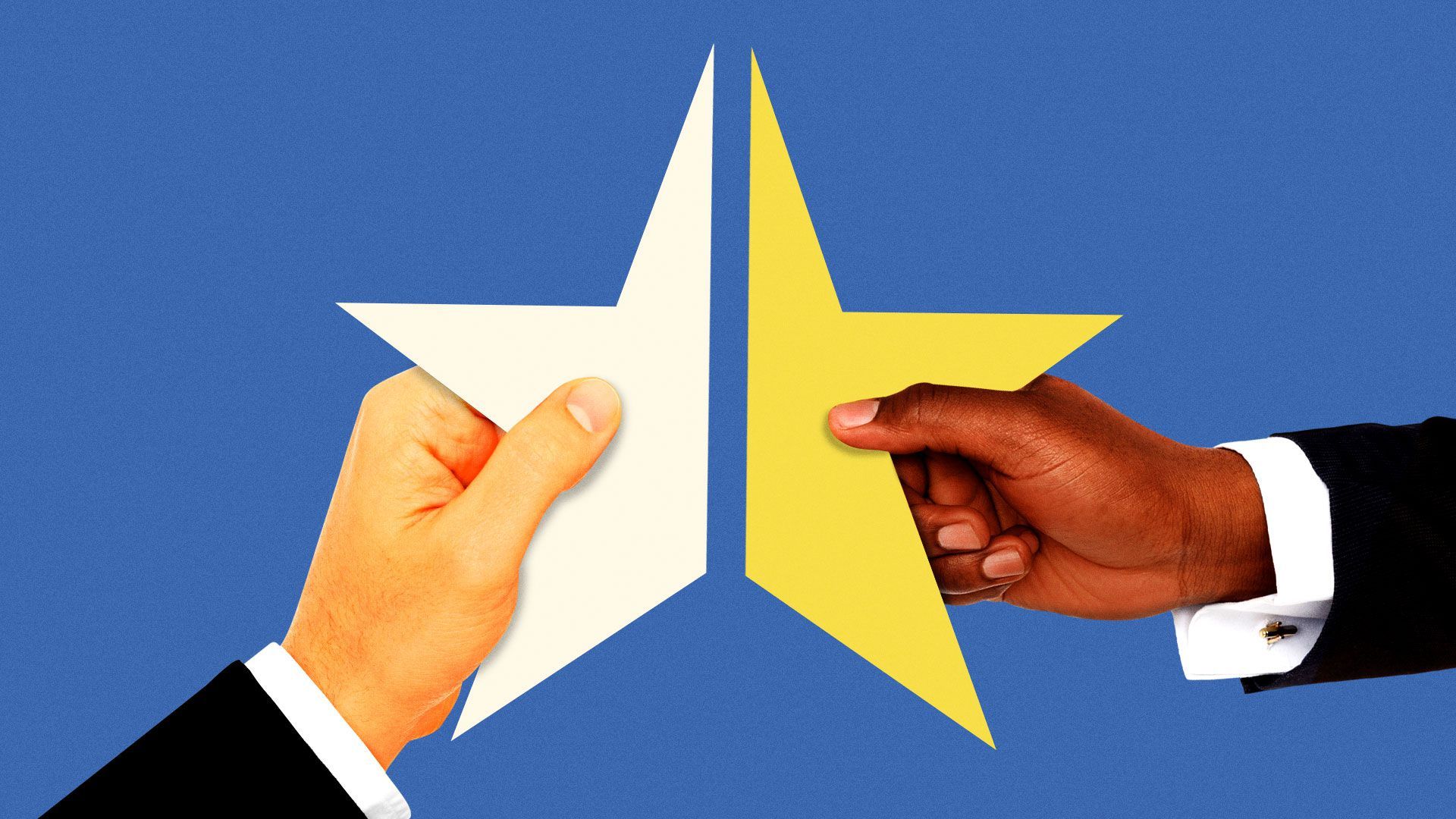 | | | Illustration: Eniola Odetunde/Axios | | | | President Biden has made it his mission to reinvigorate America's alliances and mobilize them for a new purpose: competition with China. The big picture: Biden views U.S.-China competition as the paramount foreign policy challenge of our time, and he considers America's alliances to be its most significant advantage over Beijing. The state of play: Shortly before Biden took office, the EU and China sealed an investment pact — over Biden's tacit objections — that seemed to augur poorly for the prospects of a united trans-Atlantic front on China. Things have changed dramatically. - Beijing's furious response this week to EU sanctions over its abuses in Xinjiang — coordinated with the U.S., but limited in scope — could imperil the ratification of that trade pact.
- Meanwhile, the U.S. and EU yesterday announced a new forum to coordinate on China policy.
What they're saying: Secretary of State Tony Blinken lingered on the China challenge during remarks at a NATO gathering on Wednesday, noting that Beijing was "actively working to undercut the rules of the international system and the values we and our allies share." - Blinken added that the U.S. wouldn't "force our allies into a 'us or them' choice with China" — something allies feared Donald Trump was attempting to do — but said it was time for Western alliances to demonstrate "what they stand for," namely human rights and democracy.
- China was also on the agenda when Biden met virtually with the leaders of the EU member states this afternoon.
Between the lines: European leaders are growing increasingly suspicious of Beijing, but most remain wary of a prolonged struggle that would pit the EU against its top trading partner. - German Chancellor Angela Merkel, for one, has focused more on economic synergies with China than on systemic rivalry.
- Some NATO allies, meanwhile, would rather the alliance keep its attention focused on Russia.
Blinken weighed his words carefully in Brussels, noting that "our allies have complex relationships with China that won't always align perfectly." - But he argued that if like-minded democracies could work together to develop technology and infrastructure, and to set the rules of the road on trade, "we can outcompete China or anyone else on any playing field."
- In what might be described as an "all democracies on deck" approach, Blinken said America's various alliances shouldn't operate in "siloes" but pool their various strengths.
- One area of increased cooperation could be intelligence. The Five Eyes — Australia, Canada, New Zealand, the U.K. and the U.S. — who spent decades sharing intelligence on the Soviet Union, have already become a major thorn in China's side, notes Axios' China reporter Bethany Allen-Ebrahimian.
- And while there's little desire in Europe to join an "anti-China bloc," there's a clear willingness to enter "issue-based coalitions" on everything from economic practices to human rights, says Andrew Small, a senior fellow at the German Marshall Fund.
Those coalitions will also involve America's allies and partners in Asia. Blinken made a point to travel to South Korea and Japan earlier this month before sitting down for a frosty meeting with Beijing's top diplomats. - Biden also convened the first leader-level gathering of "the Quad," an informal partnership with Australia, India and Japan.
- That grouping first met in 2007, but it's grown much closer as its members — particularly Australia and India, which once worried that the club might antagonize China — have butted heads with Beijing.
- A similar trend may now be on display in Europe.
|     | | | | | | 2. The other side: China and Europe | 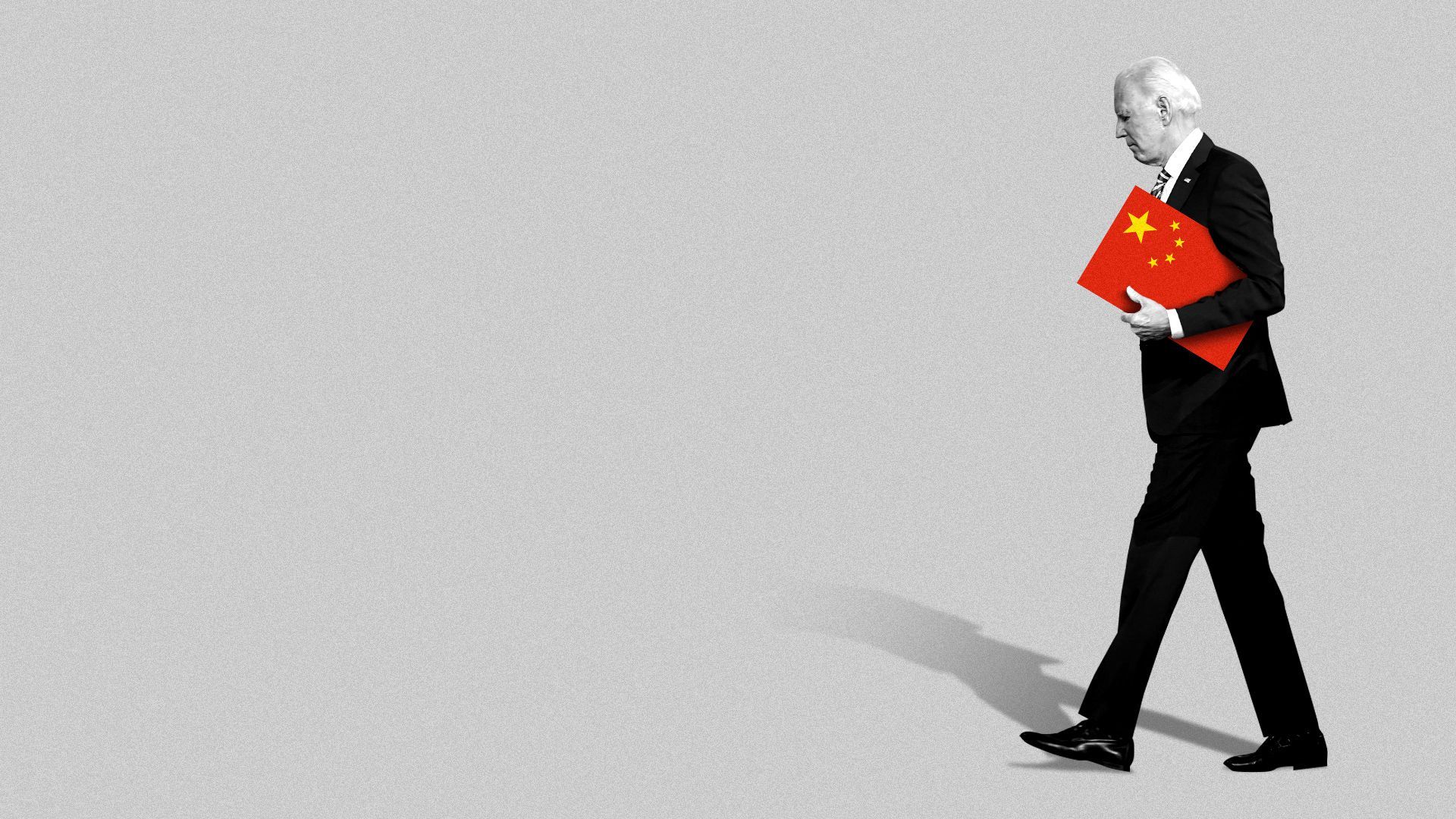 | | | Photo illustration: Aïda Amer/Axios. Photo: Drew Angerer/Getty Images | | | | That's a worrying prospect for the Chinese government, which has already lashed out at U.S. attempts to form "enclosed small cliques" in Asia and had seen the U.S.-Europe rift as a major benefit of the Trump era. Behind the scenes: "Chinese officials come through Europe and pretty much say, 'look, there's a lot that we can swallow, we just don't want to see you team up with the United States. If you do that, it's going to be a problem,'" Small says. - While China can look at the trend lines in terms of competition with the U.S. and feel relatively confident, he adds, "If it's China taking on the U.S. and its partners and allies in a kind of loosely coordinated manner, then China is still massively on the back foot."
While China has built relationships with countries all over the world, they appear shallow when compared to the decades-old U.S. alliances. - Before the EU, U.S., U.K. and Canada announced their sanctions over Xinjiang, Beijing trumpeted the fact that 64 countries had backed a statement at the UN supporting Beijing's actions there.
- Yes, but: The statement did not actually list the countries that signed on, a UN spokesperson tells Axios.
|     | | | | | | 3. India pauses vaccine exports amid surge in cases | 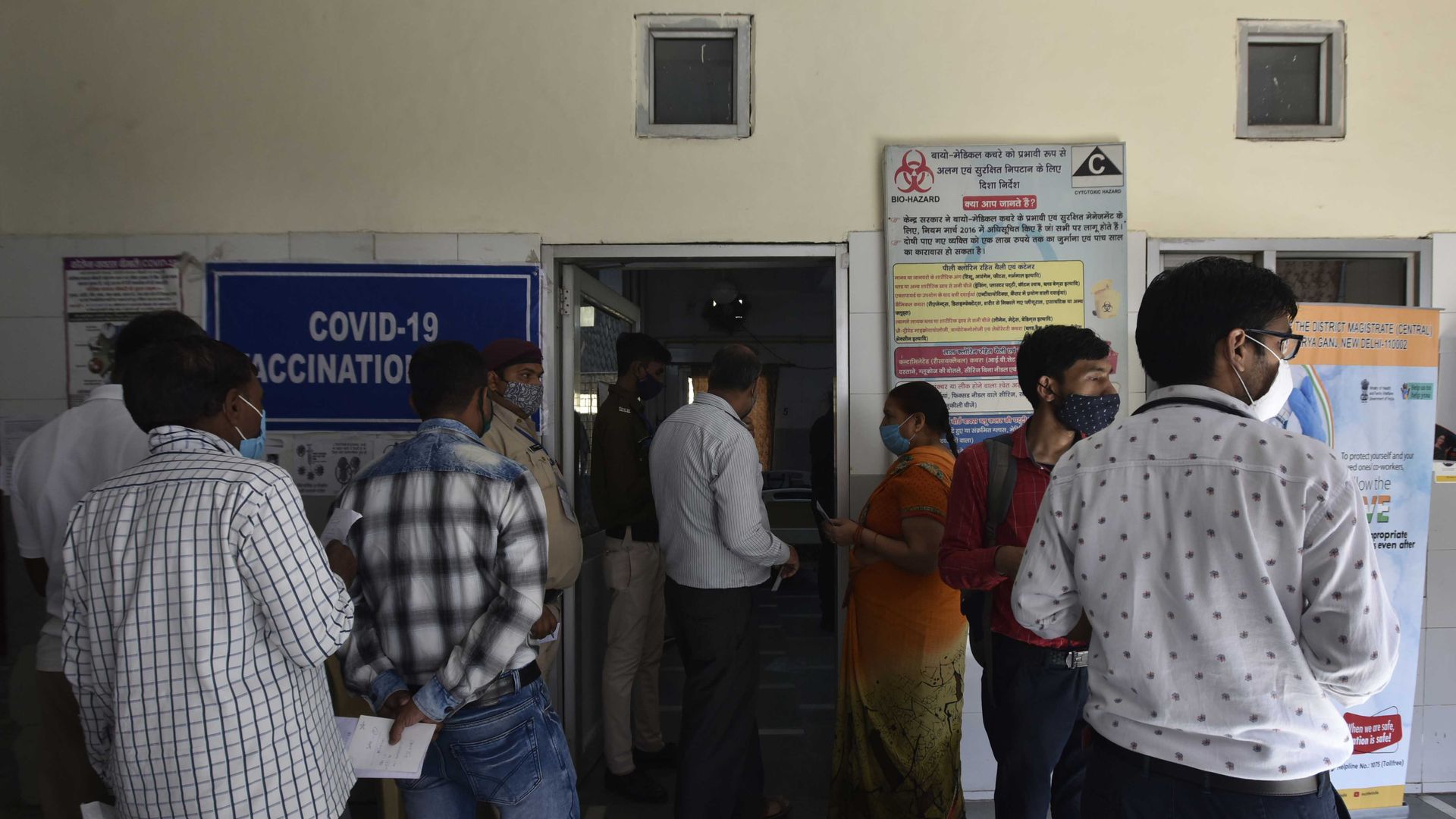 | | | Waiting for vaccines in New Delhi. Photo: Sonu Mehta/Hindustan Times via Getty | | | | Exports of the Oxford/AstraZeneca vaccine from the world's largest vaccine manufacturer, the Serum Institute of India, have been paused as India grapples with a new spike in cases, Reuters reports. Why it matters: India hasn't exported any doses at all over the past week, according to Foreign Ministry data — a worrying sign for the COVAX initiative, which is relying heavily on Indian-made vaccines to supply low-income countries. The big picture: India is one of the world's four primary vaccine producers. Only one of those, China, is not currently restricting exports or discussing doing so. - The U.S. isn't exporting any doses aside from a one-off deal with Mexico and Canada, and the EU is now debating export curbs.
India had exported 65% of the doses it produced as of last week, according to Airfinity, a science information and analytics company. - The Indian government has been engaging in vaccine diplomacy — donating doses to kickstart vaccination campaigns in the Caribbean, for example — while Indian companies have contracts to send doses all over the world, including to developing countries.
- But Serum Institute CEO Adar Poonawalla said last month that he'd been "directed to prioritize the huge needs of India."
Driving the news: India's government is placing new emphasis on plans to vaccinate 70% of the population of 1.38 billion amid a sharp rise in cases this month. - The spike is particularly discouraging because an unexpected decline in infections beginning last fall had led to hopes that Indian cities could be approaching herd immunity.
- Public health authorities say immunity may be less widespread than had been hoped, or the virus could be spreading in communities that were less affected by previous waves. It's not yet clear how big a role new variants are playing.
|     | | | | | | A message from Babbel | | How Babbel trains your brain to learn a new language | | |  | | | | Unlike other apps that use machine learning to teach you languages, Babbel takes a human-based approach. What this means: Lessons are built by over 150 linguists and prepare you for situations you'll actually encounter in real-life. No random words or abstract grammar. Sign up and get 50% off. | | | | | | 4. Interview: David Miliband on solving Yemen's human-made crisis | 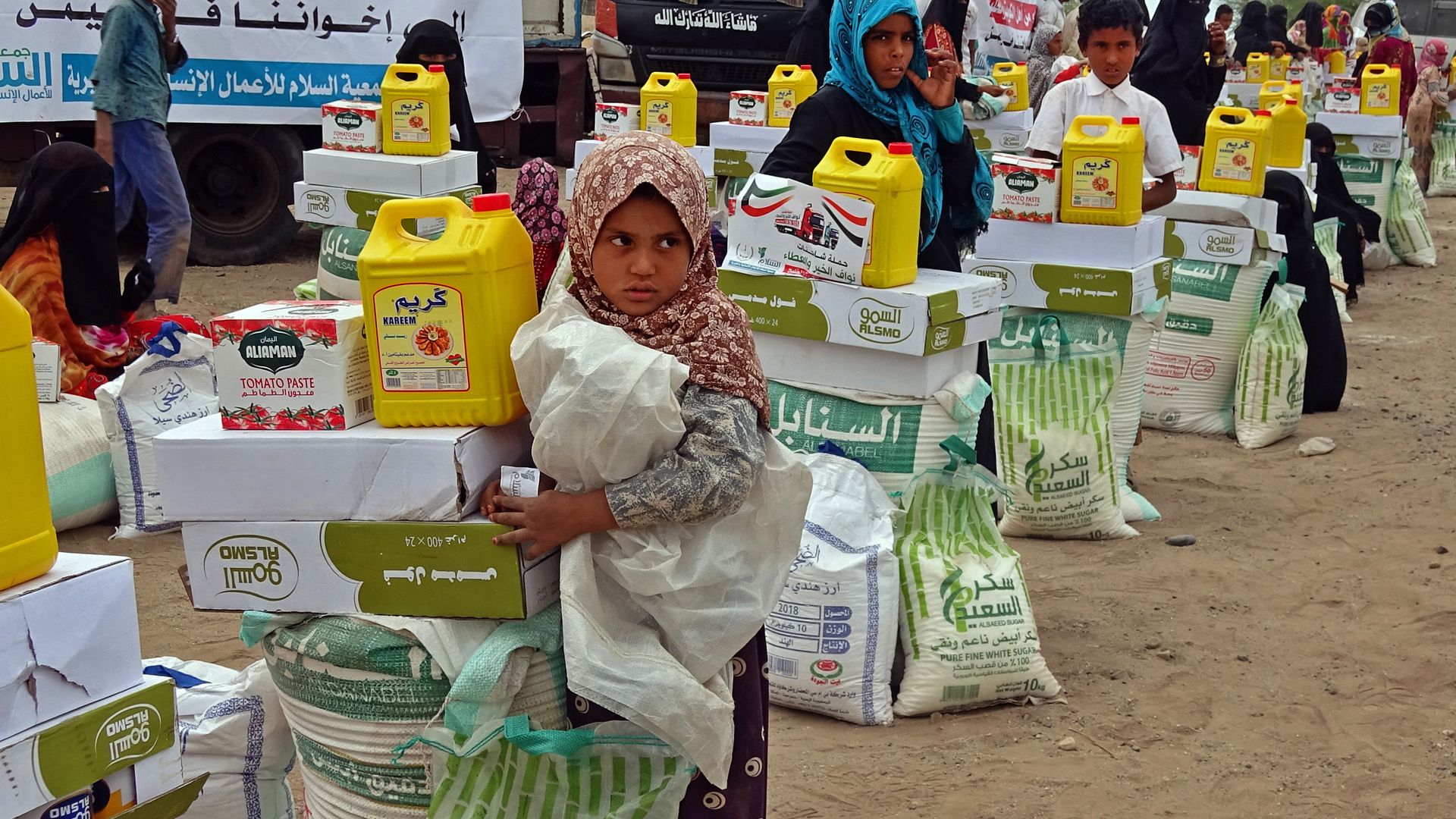 | | | Food aid arrives in Hodeida. Photo: Khaled Ziad/AFP via Getty | | | | Yemen's humanitarian crisis has never been more dire, but the arrival of the Biden administration and a renewed push to end the conflict create "the best chance for six years to end the war," International Rescue Committee CEO David Miliband tells Axios. The state of play: Prices of staples like flour have more than doubled since 2016, per the IRC, and an economy that was already among the world's poorest has been devastated by the fighting. That leaves millions reliant on food aid to survive, but Yemen's major ports are blockaded and its international airport is closed. The Saudi-led coalition imposed the blockade in 2015 after the Houthi rebels took the capital and the ports. - Both sides are disrupting aid deliveries, Miliband says. It typically takes three to four months to get a permit to deliver aid to more populous northern Yemen, controlled by the Houthis, and two months to deliver it to the south, controlled by the internationally recognized government.
- And there's less aid to deliver in the first place as wealthy countries cut back. A donor conference on March 1 raised less than half of what was hoped.
- Zoom in: The World Food Program provides food aid to around 8 million Yemenis, but it was forced to significantly reduce assistance last year to northern Yemen due to "a challenging operating environment and a decreased funding outlook."
"If you're trying to deliver aid when conflict is still going on, it's like trying to run up a downward escalator. You can do it for some time, but in the end, you get exhausted and the escalator wins and you end up in a heap at the bottom," Miliband says. - "And that's the tragedy for so many Yemeni people at the moment. There's malnutrition on a grand, man-made scale and it's totally inexcusable."
Driving the news: Saudi Arabia proposed a ceasefire on Monday, offering to lift the blockade if the Houthis would enter peace talks. - The Houthis demanded that the Saudis lift the blockade first before they agree to a ceasefire. The UN and U.S. are working to forge an agreement.
- "Unless we get a new type of approach, then humanitarian needs will continue to be held hostage to diplomatic game-playing and the realities of Yemen's fragmented, brutal, impoverished situation will only get worse and worse," Miliband says.
The bottom line: "The truth is that people have turned their eyes away from what's going on in Yemen. And since it's the world's worst humanitarian crisis, that's a collective crisis of very serious proportions." |     | | | | | | 5. Global news roundup: It's still stuck |  | | | Photo: Suez Canal Authority/HO/AFP via Getty Images | | | | 1. The big ship is still stuck in the Suez Canal, and it could remain so for weeks. Why it matters: The Suez accounts for approximately 30% of container shipping volumes, and blocking it for even a short time will cause oil prices to rise — and remind us that the entire global economy relies on really, really big ships, Axios' Bryan Walsh writes. 2. Lawyers for Russian opposition leader Alexei Navalny fear his health is deteriorating in prison and say he has been denied access to a doctor, Axios' Ivana Saric writes. 3. The results are in from Israel's election, and Prime Minister Benjamin Netanyahu's right-wing bloc is two seats short of a majority. He still has some cards to play, but the most likely outcome is yet another election, Axios' Barak Ravid reports. |     | | | | | | 6. Biden on Afghanistan, North Korea and China | 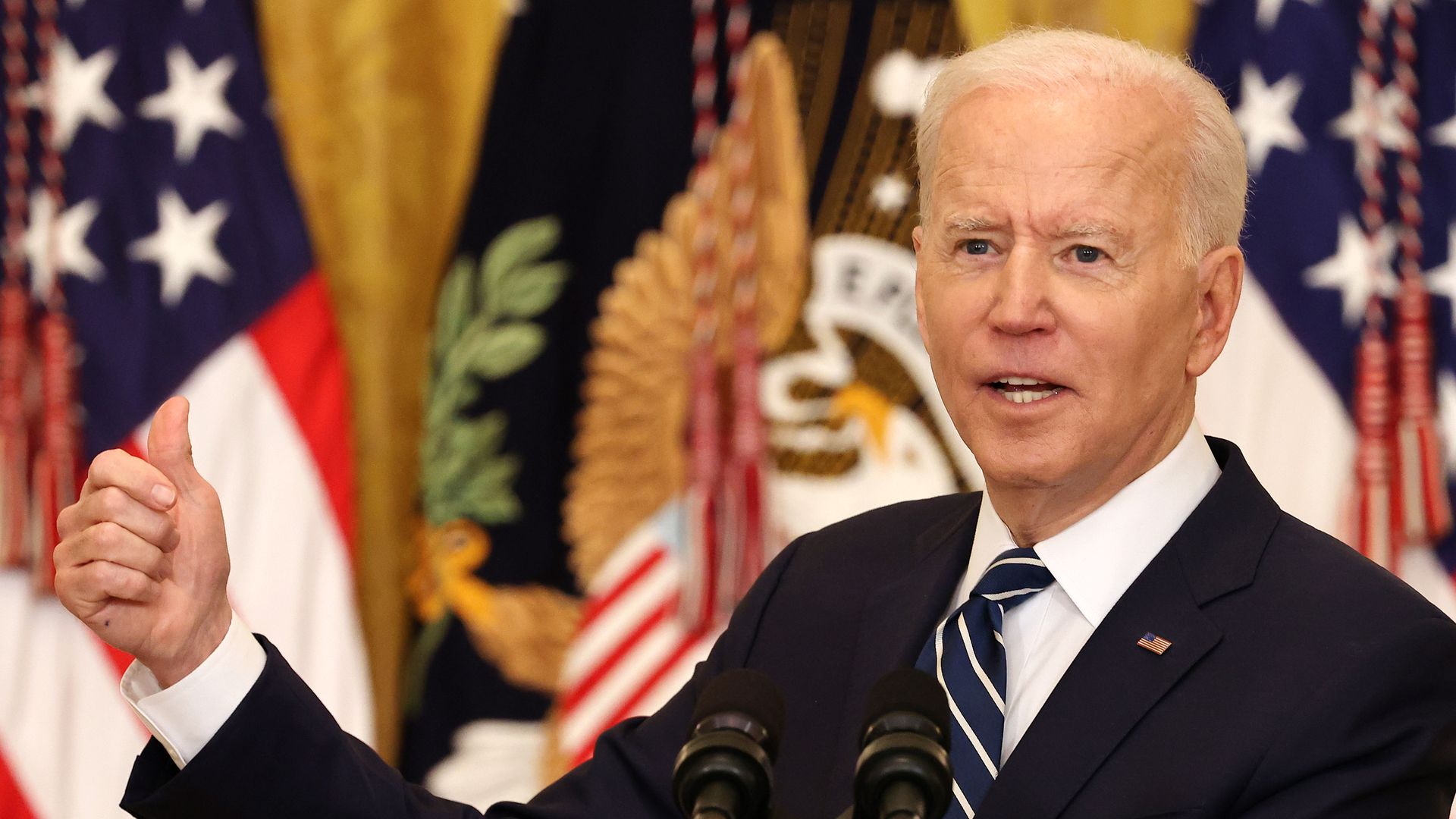 | | | Photo: Al Drago/Getty Images | | | | In a lengthy press conference today at the White House... - Biden said that it would be "hard" for the U.S. to meet a May 1 deadline to withdraw from Afghanistan, but he "can't picture" U.S. troops remaining in the country until next year. Go deeper.
- Biden said he's considering consequences for North Korea's ballistic missile test last night, but added that he's also ready to engage in diplomacy aimed at denuclearizing North Korea (Pyongyang has rejected talks on those grounds). He also said he agreed with Barack Obama that North Korea was the top foreign policy challenge he faced.
- Biden called China's Xi Jinping a "smart, smart guy" who "doesn't have a democratic bone in his body."
|     | | | | | | 7. Stories we're watching | 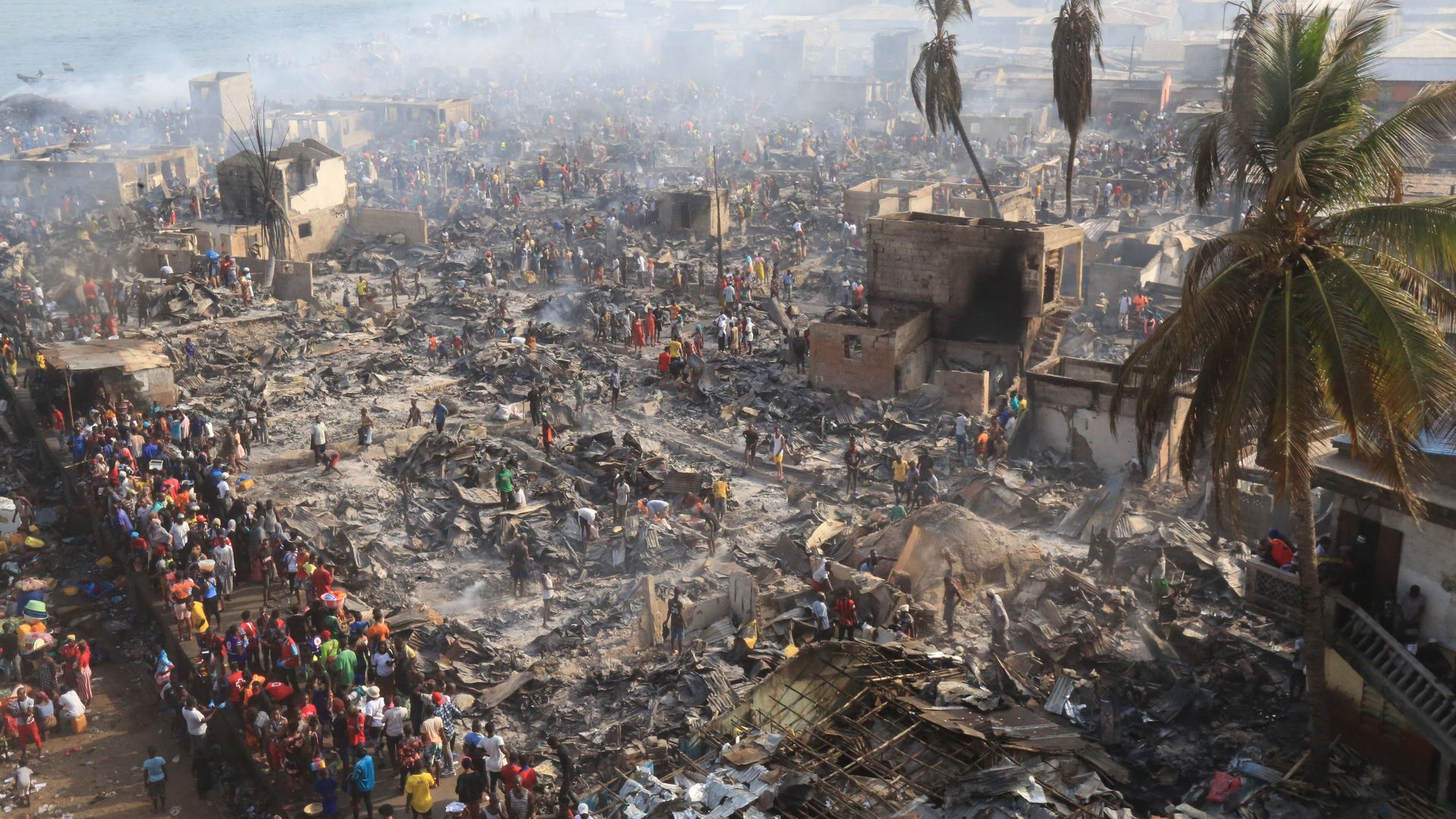 | | | The aftermath of a fire in Freetown, Sierra Leone. Photo: Saidu Bah/AFP via Getty | | | - How U.S.-China tensions can fuel anti-Asian racism
- Biden to host Japan and South Korea to talk North Korea
- Germany reverses Easter lockdown plan
- Brazil's grim virus milestone
- AP journalist Thein Zaw released from jail in Myanmar
- Uyghurs in Turkey protest visit by Chinese foreign minister
- Biden restores aid to Palestinians after Trump's cuts
Quoted: "A very heavy beached whale." — Peter Berdowski, CEO of the company trying to unblock the Suez canal, describing the ship that has been stuck there since Tuesday. |     | | | | | | A message from Babbel | | The app that'll teach you a new language in less than a month | | |  | | | | Babbel helps you become conversational in a new language with just three weeks of practice. The number one selling language app teaches you the skills you need for real-life scenarios, excluding any random words or unhelpful phrases. Get 50% off one of 14 languages. | | | | | | Axios thanks our partners for supporting our newsletters.
Sponsorship has no influence on editorial content. Axios, 3100 Clarendon Blvd, Suite 1300, Arlington VA 22201 | | | You received this email because you signed up for newsletters from Axios.
Change your preferences or unsubscribe here. | | | Was this email forwarded to you?
Sign up now to get Axios in your inbox. | | | | Follow Axios on social media:    | | | | | |











No comments:
Post a Comment